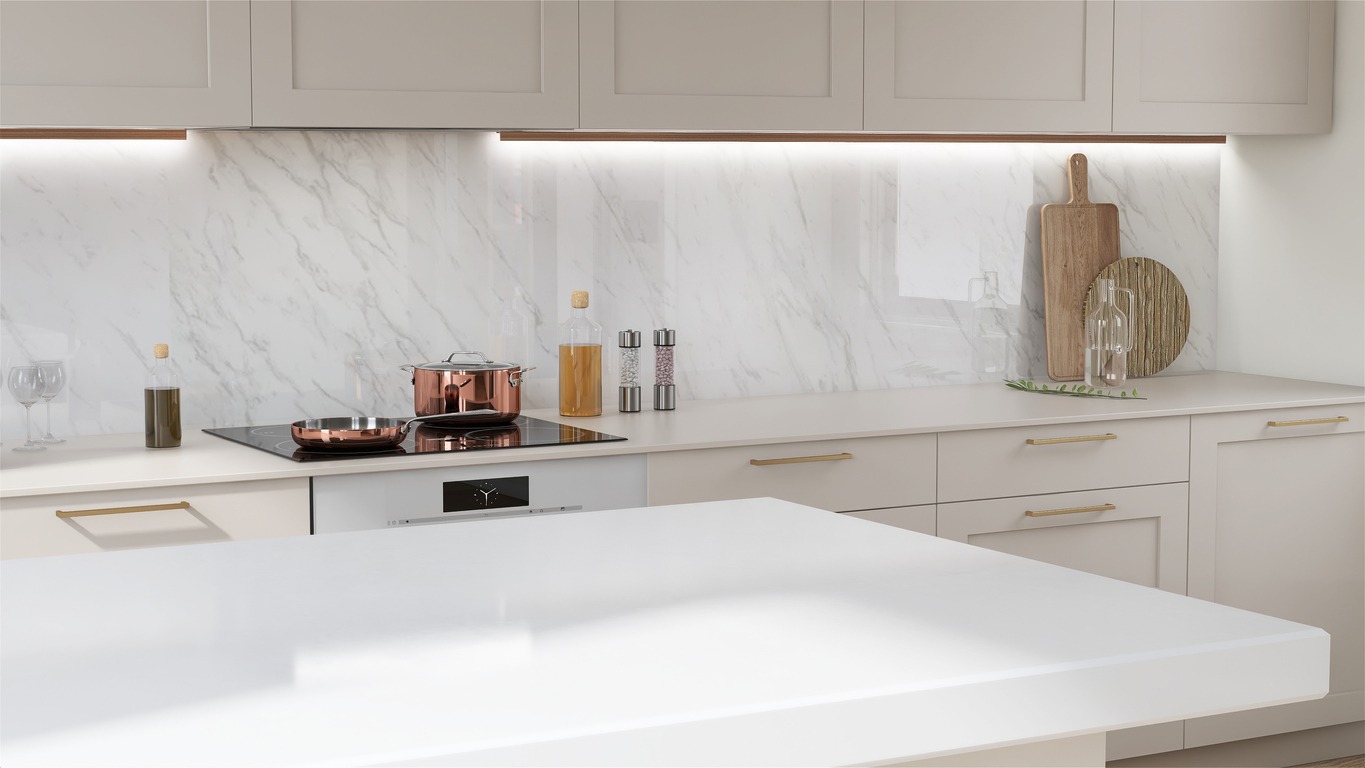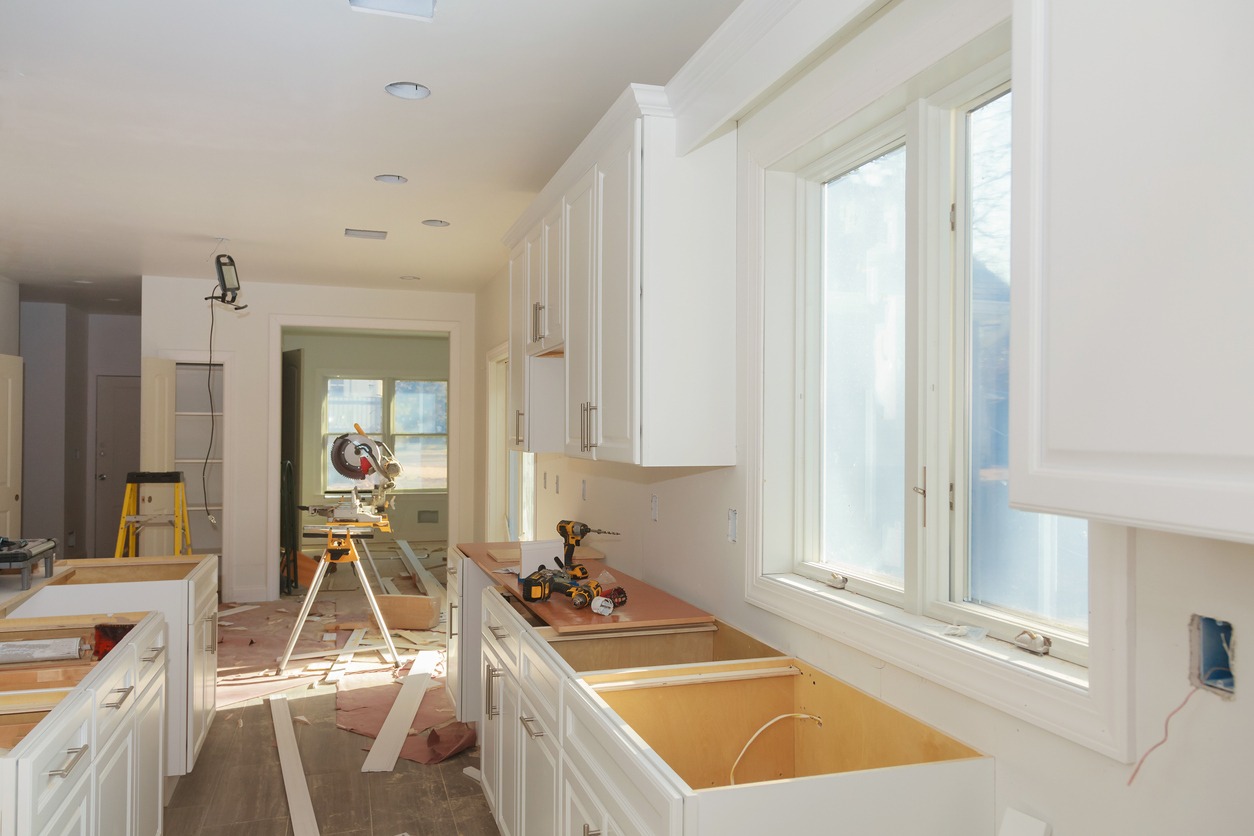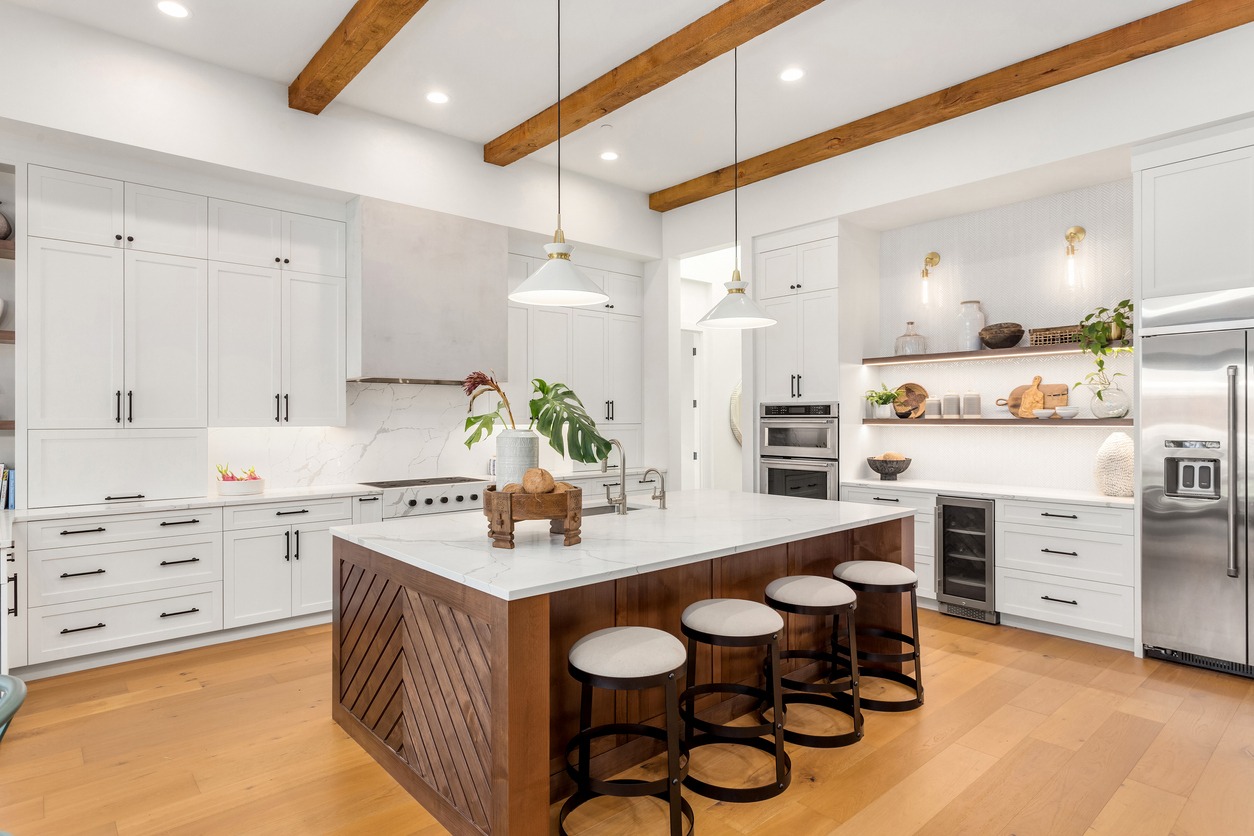Kitchen countertops are some of the most frequently used surfaces in your home. They play an essential role in a functional kitchen. However, with time and regular use, countertops can accumulate scratches, dents, chips, and other imperfections like scorch marks, swelling, and fading. When your kitchen countertops no longer align with your desired style, become too damaged to repair, or are simply too demanding to maintain, it’s time to start considering countertop replacements.
Explore new styles that match your home’s aesthetic and research various materials to find one that suits your needs, including maintenance requirements, cost, ease of installation, and repairability. Before you decide, there are some vital factors to consider:
Assess if it can still be repaired.
When your kitchen countertop starts showing signs of wear and tear, the first question is whether it’s salvageable or if it’s time for a replacement. Replacement is a considerable undertaking, which costs a lot of money, time, effort and preparation. So if you have the option for repair, you may want to consider it first before doing a complete overhaul.
Depending on the material, you might have options to bring it back to life. For instance, laminate countertops can be sanded and repainted to freshen up their appearance, while stone chips can be fixed with epoxy if you have the missing piece. You can even find pens to cover up noticeable scratches.
However, if these fixes won’t do the trick or you’re simply ready for a change, replacing the countertop is a great way to give your kitchen a new look. Just remember that removing the old countertop and potentially altering or replacing cabinets and plumbing may be necessary, depending on the size, weight, and design of the new countertop.
Consider how the project will affect your kitchen and household.
Once you’ve decided to replace your old countertops, it’s important to consider how this project will affect your kitchen and the rest of your home. Large renovations like this can take several days, so it’s a good idea to set up an alternative food preparation area outside the kitchen.
If you’re hiring professionals for the job, think about the most convenient access point to your kitchen, lay down protective cloths from the entryway to the kitchen, and communicate with your contractor about parking arrangements. Be aware that your existing backsplash might suffer some damage during the countertop installation. Additionally, the cabinets beneath the old countertop could have hidden issues that require attention or reinforcement before the new countertop can be installed.
Removing the sink and faucet is part of the process, and any plumbing, gas, or electrical connections that might interfere with the installation need to be disconnected. It’s a good idea to consult with your contractor to ensure a smooth and efficient installation process.
Decide whether to go DIY or hire professional help.
When it comes to home projects, some are a breeze for experienced DIYers, while others may fall outside the typical DIY skillset. It’s a smart move to assess your own abilities and compare the potential outcomes of a DIY endeavor against the added expense of hiring a professional installer. If you choose the DIY route, make sure you’re not going over your head and ensure that you can push through until the installation process is done.
Keep in mind that kitchen countertops can be quite hefty, often weighing over 200 pounds. If you decide to tackle this project yourself, you’ll likely need an extra pair of hands. Going the DIY route can save you money on labor costs, which can range from about $10 to $30 per square foot. However, if you lack the expertise needed to assess the situation and carry out the installation correctly, there’s a significant risk that mishaps may occur during the DIY process, potentially leading to additional expenses for repairs.
Also, remember that there are countertop materials that are not for DIY installation, as you may lack the proper tools and equipment needed to tackle the job and handle its hefty weight. Unless you’re a professional countertop contractor yourself, it’s better to leave it to the pros.
Be prepared.
Once you’ve made up your mind about DIY or professional help, it’s time to think about the necessary preparations before installation. Your kitchen should be thoroughly cleaned, and all items—utensils, cookware, dishware, food, and appliances—should be relocated to grant access to the countertop.
Over time, cabinets or floors may have settled, causing a slight unevenness in the structure. While some countertop materials can adapt to this, natural stone options like marble or granite may crack if the structure isn’t level. To avoid this, ensure that your cabinets have a maximum unevenness of 1/8 inch over a 10-foot span.
Another consideration is the existing sink and faucet, which may need adjustments to fit the new countertop, or you might have to swap them out for compatible replacements. It’s important that either the old or new sink and fixtures are available for creating the countertop template. Without these measurements, the project won’t be able to proceed smoothly.
Evaluate the suitability of your kitchen cabinets.
Switching from a plastic laminate countertop to stone? It’s crucial to confirm that both your cabinets and, for that matter, your flooring can handle the added weight.
Before you choose a countertop material, the first step is to consider the quality and strength of your existing kitchen cabinets. Some lower-grade cabinets may lack the necessary structural strength to bear the load of heavier countertop materials. For instance, three-quarters-inch thick granite can weigh around eighteen pounds per square foot, potentially adding several hundred pounds to your counters.
Decide if you want to keep your current cabinets or replace them as well. If you’re planning to replace the cabinets in the near future, consider delaying the new countertop installation job – it’s more cost-effective to do everything together to avoid double installation fees.
Choose the perfect kitchen countertop material.
When it comes to kitchen countertop materials, the options seem endless, making it a challenge to pick the right one for your home. There are budget-friendly choices like solid-surface and laminate, boasting a wide range of designs and colors. However, they may not be the most durable and might need periodic touch-ups to maintain their appearance.
On the other hand, you have robust options like granite or marble that exude elegance but come with a hefty price tag. These materials can handle heat and wear like champs but do require resealing every one to two years to prevent stains, given their porous nature.
If you’re after a specific aesthetic, stainless steel countertops offer an industrial or commercial vibe. Recently, soapstone countertops have gained popularity, though they share the staining vulnerability of marble unless sealed properly. For those willing to invest, nonporous quartz is a resilient, stain-resistant, and heat-resistant choice.
Ultimately, the decision hinges on factors like durability, maintenance ease, longevity, cost, and personal style preferences to determine the perfect kitchen countertop material for your home.
Take your plumbing into consideration.
When you’re gearing up to replace your countertop, don’t forget to think about your sink’s setup. If you have a farmhouse sink that sits below the countertop level, you might not need to replace it when you upgrade your counters. However, for sinks that sit on top of the counter, it’s often necessary to replace them or, at the very least, adjust the plumbing before installing the new countertops.
Your new countertop could be taller than your previous one, which may lead to your sink’s drain pipe not reaching the sink’s bottom. You might also need to make faucet adjustments to fit the new countertop. It’s a good idea to have a conversation with your countertop installers to determine if your current sink can be retained or if a replacement is needed.
Consider your backsplash.
When you’re in the process of replacing your countertops, it’s crucial to give your backsplash a good look too. New countertops can breathe fresh life into your kitchen, especially if you’re also upgrading your cabinets. However, an outdated backsplash might suddenly seem out of place and might not match your new countertops.
You can either aim for a matching backsplash material or one that harmonizes with your countertop to create a cohesive look. There’s a wide array of materials and design ideas to choose from to help you craft your ideal kitchen.
If your new countertops are thicker than the old ones, your backsplash might extend too far down the wall and intersect with the new counters. You might also want to explore new design ideas for your kitchen remodel, which often involves replacing the backsplash, especially if your old and new countertops differ significantly.
Considering your maintenance preferences.
As you choose a countertop material, it’s essential to contemplate how much maintenance and care you’re willing to invest in your new countertops.
Different materials require varying levels of maintenance. Some may need regular sealing, while others are more forgiving. Natural stone like marble and granite will demand sealing and specialized cleaning routines. On the flip side, concrete, quartz, and solid surface countertops are low-maintenance options. While materials such as copper and wood won’t require excessive upkeep, they may acquire a charming, weathered appearance over time.
Ask around and research about the cleaning and maintenance requirements for the selected material.
Explore your aesthetic.
Arguably the most significant factor in choosing your countertop material is your personal design preference. Your countertops serve as the central visual element in your kitchen, setting the tone for the entire space. It’s essential to select not only something that complements your color scheme but also something that resonates with you for years to come.
If a modern or minimalist look appeals to you, consider quartz, solid surface, or concrete countertops. Granite and marble lend a traditional, upscale ambiance, while tile imparts an older, European feel. For a touch of rustic charm, wood or copper could be excellent choices for your home.
Check compatibility with your existing appliances.
Consider how your current appliances will pair with your new countertop. Think of it like wearing a brand-new outfit with an old pair of shoes. Sometimes, the combination can clash.
If aesthetics matter to you (as I’m sure they do), you might contemplate updating your old appliances. However, if your appliances are relatively new and still in excellent working order, you can certainly keep using them alongside your new countertops. Consider replacing only those that are no longer functional or don’t fit your kitchen’s style.
If you have a cooktop that you’re not ready to replace yet – there’s no need to worry. A cooktop is typically installed on top of the surface and can be easily removed and reinstalled in the same spot, assuming the base cabinet remains unchanged in size.
Don’t forget about lighting.
Make sure to take into consideration your lighting situation in the kitchen. Different countertop materials can affect how light is reflected in the space. Ensure your new countertop doesn’t create glare or shadows.
If you have under-cabinet lighting, it can be challenging to figure out how to reroute the wiring during reinstallation. Under-cabinet lighting can create glare on highly polished stone surfaces, which can strain your eyes. This is something to bear in mind when selecting your countertop material.
Check your budget.
Let’s face it, replacing a kitchen countertop isn’t exactly a budget-friendly endeavor. Even if you decide to tackle the project yourself, you’ll still have expenses for materials, installation supplies, any tools you don’t already own, and potentially the disposal of the old countertop. Additionally, you might need licensed professionals like plumbers, electricians, or gas fitters to disconnect any electrical, gas, or plumbing connections before the countertop replacement can happen.
Managing these costs and embarking on a DIY countertop replacement can save you roughly $10 to $30 per square foot in labor charges. However, keep in mind that you’ll shoulder all the responsibility for materials and installation, so if anything goes awry, it’s up to you to cover the costs and address the issues.
If you opt for professional assistance, the installation of countertops typically ranges from around $2,000 to $4,500, with potential costs exceeding $8,000 or dipping as low as $400, contingent on factors like material, square footage, custom design, and other variables.
If you have a generous budget, materials like natural stone, quartz, copper, and wood may be within reach. For a mid-range budget, you might find limited options in granite or concrete. If your budget is tight, laminate and similar choices may be more suitable for your needs.
Shop wisely.
Be cautious with low-cost, prefabricated stone surfaces. Typically, these come in only a few common types of stone. The slabs are pre-cut to fit standard cabinet depths but may not accommodate variations in walls or seam placements.
While it might require a bit more investment, opting for a custom approach and collaborating with dependable design and installation experts, is the wisest choice. A new countertop may not necessarily revolutionize your kitchen’s functionality, but it can certainly bring a stylish enhancement that you’ll thoroughly enjoy.
Frequently Asked Questions (FAQ)
Can you replace granite countertops without damaging the backsplash?
Yes, it’s possible, but it’s a challenging process. You’ll need to remove the countertop from the wall to access the backsplash. Failing to do so could lead to scratches or cracks in your countertops.
Can you install your own kitchen countertops?
While it’s possible to install your own kitchen countertops, having construction experience is advisable. Certain countertop materials, like granite, marble, and stainless steel, are best installed by professionals.
What is the easiest countertop to install?
For DIY countertop projects, the easiest materials to work with are solid surface, plastic laminate, and wood. These materials are lightweight, can be cut easily, and are repairable.
Can you put new laminate over old countertops?
Yes, you can apply new laminate over existing surfaces, but the surface must be smooth and even. Be sure to address any gouges and scratches before gluing the new material in place.
What is the most cost-effective way to replace countertops?
There are several budget-friendly options for replacing countertops, including various types of laminate. Tile is another affordable choice. If you’re willing to install the countertops yourself, wood can be a cost-effective option. Additionally, you can salvage used countertops and restore them for a cost-effective solution.




